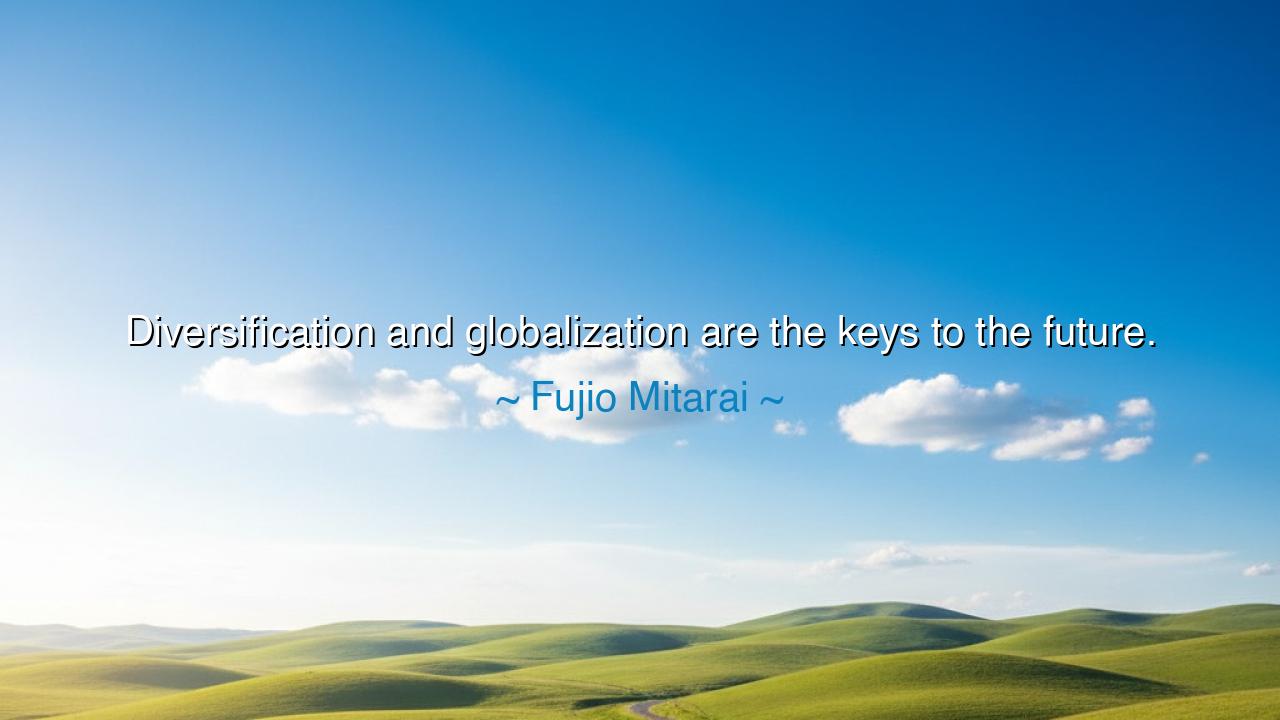
Diversification and globalization are the keys to the future.






The words of Fujio Mitarai—“Diversification and globalization are the keys to the future”—resonate like a prophecy carved upon the gates of the modern world. They carry the weight of vision, the foresight of one who has seen how the tides of change rise and fall upon nations, industries, and civilizations. In this saying lies not merely a business principle, but a universal truth: that survival and progress depend on adaptation, on reaching beyond the familiar, and on embracing the unity of a world that grows ever more connected. Mitarai’s wisdom is a reminder that those who isolate themselves, who cling to a single form or narrow path, will fade into stillness—while those who diversify and open themselves to the world will thrive, transforming uncertainty into opportunity.
In the style of the ancients, we may say that this is the teaching of balance and expansion. For in nature, every tree that grows too rigid in a single direction is broken by the storm, but the tree that bends and branches in many ways endures the wind. So too with people, businesses, and nations: diversity of skill, thought, and perspective is the foundation of resilience. Fujio Mitarai, the visionary leader of Canon Inc., spoke these words not from theory but from experience. When Canon faced crises in global markets, he guided the company through renewal—expanding beyond its origins, embracing new technologies, and reaching into foreign lands. He saw that to diversify was to evolve, and to globalize was to transcend boundaries that once confined growth.
This philosophy is as ancient as it is modern. The Silk Road, that legendary artery of trade, once connected the East and the West not only through goods but through ideas. It was globalization in its earliest form—a living network of exchange where cultures learned from one another, and progress was born from diversity. Mathematics traveled from India to Arabia to Europe; paper and printing journeyed from China to the world; spices, silk, and wisdom flowed between civilizations. Empires that welcomed this exchange flourished in wealth and enlightenment, while those that closed their gates withered in isolation. Mitarai’s words, though uttered in the age of satellites and silicon, echo the same eternal principle: the future belongs to those who connect.
But diversification and globalization are not only the affairs of nations or corporations—they are the lifeblood of the human spirit. Every soul that grows must diversify its knowledge, its compassion, its courage. To understand oneself, one must first understand others; to build one’s destiny, one must learn from many worlds. Diversity of mind is the safeguard of wisdom. A man who sees through only one lens lives half-blind. A people who listen only to their own voices will one day find themselves shouting into silence. In this way, the message of Mitarai transcends economics—it is a call to all who seek greatness to open their hearts to the world.
History offers countless lessons of those who heeded this call. Consider the Renaissance, that rebirth of art, science, and culture in Europe. It was not born in isolation, but through global exchange—through the rediscovery of Greek philosophy preserved by Arabic scholars, through trade that brought wealth and curiosity, through the meeting of minds across languages and lands. From this tapestry of shared knowledge came the brilliance of Leonardo da Vinci, who studied anatomy, mechanics, art, and mathematics alike—a master of diversification who embodied the harmony of many disciplines. His genius reminds us that the more branches the tree of knowledge grows, the more sunlight it captures from the sky.
Yet, in this age of speed and connectivity, the challenge lies not in connecting, but in connecting wisely. For globalization without empathy can become exploitation; diversification without purpose can become chaos. Mitarai’s teaching, properly understood, is not a call for endless expansion, but for meaningful growth—to widen our reach while deepening our integrity. True globalization must unite, not divide; true diversification must empower, not confuse. The ancients would say: expansion without harmony is the way of ruin, but expansion guided by vision is the way of the eternal.
And so, my child, take this lesson to heart: be many, yet be one. In your learning, diversify; in your work, collaborate; in your vision, think beyond borders. Seek knowledge from all corners of the world, for wisdom wears many faces. When the winds of change blow, do not stand rigid—bend, grow, and reach toward the light. For in the great weaving of humanity’s future, every open mind becomes a thread of strength.
Thus remember the words of Fujio Mitarai: “Diversification and globalization are the keys to the future.” For the future belongs not to those who hoard what they know, but to those who share, adapt, and evolve. Build bridges where there are walls; plant many seeds where there was once only one. And as the world becomes ever more vast and intertwined, may your spirit, like a great tree, spread wide its roots across the earth—and yet, through all its branches, remain true to its heart.






AAdministratorAdministrator
Welcome, honored guests. Please leave a comment, we will respond soon